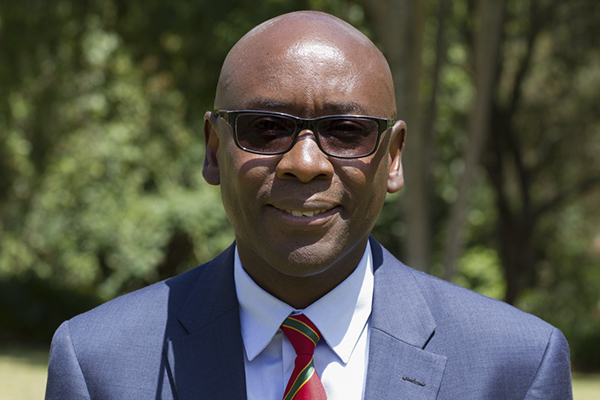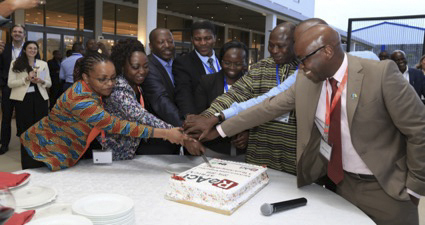2019-08-29
End July ReAct Africa, together with South Centre, arranged its annual conference, bringing stakeholders on antimicrobial resistance in the Africa region together. This year's theme was antimicrobial resistance and the link to Universal Health Coverage and Sustainable Development Goals. Dr. Rashid Abdi Aman, Chief Administrative Secretary, Ministry of Health, Kenya, officially opened the conference highlighting that AMR is a serious public health concern with health, economic, political and social effects:
"There is therefore need to mitigate beyond the health agenda." He further emphasized on the linkage between AMR, UHC and SDGs. He lauded the theme of the conference, saying that it was timely and would inform the UN high level meeting, set to be held in September 2019.

The conference had over 120 multi-sector participants from 33 different countries and were drawn from human, animal and environmental health sectors: experts on UHC and AMR, civil society representatives, representatives from intergovernmental agencies such as the World Health Organization (WHO), Food and Agriculture Organization of the UN (FAO), World Organisation for Animal Health (OIE) and various Ministries of health among others.
Through presentations, discussions and sharing of case studies, the 3-day conference covered a range of topics in the context of antimicrobial resistance (AMR) and the efforts towards attainment of Universal Health Coverage (UHC). These included country progress in the implementation of National Action Plans on AMR, infection prevention and control, One-Health concept, surveillance and diagnostics, medicines quality and regulation, AMR in the animal and environmental sectors, nutrition, antimicrobial stewardship, sustainable financing for UHC among others.

“The learning and exchange of experiences on the antimicrobial resistance situation and policy responses at the country level – including on National Action Plans, needs, successes and challenges faced in implementation – will go a long way in informing the UHC and AMR global agendas.”
Mirfin Mpundu, Head of ReAct Africa
Three key takeaways from the conference:
1. Building political momentum on the link between AMR and UHC
There is a need to emphasize the importance of AMR if we are to achieve the UHC. AMR is a global crisis with significant global health security implications. During the conference several perspectives on different entry-points for working on AMR while implementing UHC were presented. Meeting participants can contribute to amplify these messages in their respective country, and ReAct will further contribute to this through a policy brief on UHC and AMR to be published soon.
“AMR is increasingly becoming one of the key global challenges and at the same time the people in the developing countries will suffer the most,”
said Viviana Muñoz Tellez, Coordinator, Health, Intellectual Property and Development Programme, South Centre.
It is important to streamline efforts to address AMR in the context of UHC as UHC provides the best framework to address AMR.
2. Address basic needs and preventive work
It will be important to focus on certain components of the health system, such as basic infrastructures, access to quality medicines and diagnostic tools, water, sanitation and hygiene, infection prevention and control, while working on implementing UHC and National Action Plans on AMR.
3. Keep the One Health spirit and work together
While the theme of the conference was Universal Health Coverage, work on AMR requires attention to not only the Health-related Sustainable Development Goals of the 2030 agenda for Global Development. We need to maintain the One Health spirit and encourage further work at national level to establish platforms for collaboration across sectors in implementing National Action Plans on AMR. This requires more work to mobilize colleagues from other sectors and areas of work.
Dr. Mirfin Mpundu, Head of ReAct Africa was on a Kenyan national TV station a day before the conference talking about the upcoming conference and importance of the theme.
Support countries in implementing National Action Plans on AMR
The conference revealed that a number of countries in Africa are making progress in the development and implementation of NAPs on AMR and provided a platform for sharing country experiences and learning. But there is still a need to support countries in their work on implementing National Action Plans (financial and technical), especially finances to help implementation is urgent. Still, there is a need to start working with the available resources. AMR is a challenge that cannot be addressed overnight by one country. There is also a need for more data to identify the needs – for prioritization what interventions to finance.
Resilient primary health care systems are fundamental to address AMR
The conference underscored strong, resilient primary health systems are fundamental element of addressing AMR and a key component in the progress to attainment of UHC. By reducing the incidence of infection through effective sanitation, hygiene and infection, prevention and control measures, we reduce the need for the use of antimicrobials.
“We require well-structured resilient systems that will prioritize on prevention, not just treatment”,
says Dr. Jane Lwoyero, Program officer, World Organization on Animal Health.
Healthcare workforce play a major role in the handling of antibiotics and building their capacity is an important facet of antibiotic stewardship especially in low- and middle-income countries (LMICs). By integrating UHC and AMR, the conference explored the importance of working with various ministries including health and finance ministries in national governments. Effective governance is central to improving quality of healthcare delivery.
Case study from one of Kenya’s 47 counties
A case study from Dr. Andrew Mulwa, Minister of Health, Makueni County; one of the Kenya’s 47 counties was very well received by participants who managed to learn from the experiences he presented. Makueni is a rural county, with a population of about 1 million people and has been a pioneer county to pilot UHC in Kenya. Dr. Mulwa shared insights on the milestones the county has achieved.
- The county has made significant investments in the healthcare system by allocating > 30% of its annual budget to healthcare.
- The county’s health approach is informed by the WHO’s health system building blocks. All revenue generated in the county hospitals is ploughed back to improve service delivery.
- Other streams of revenue to strengthen hospital operations include recurrent hospital financing, free maternity, universal healthcare and reimbursements.
- With a predictable and reliable financing mechanism, hospitals have been able to undertake development projects, recruit staff on contract basis and fund operations supplementing the National Government’s funding resulting in high quality service delivery.
- The county is keen on quality improvement models and utilise Standard Operating Procedures. Makueni is famous for its Universal Healthcare Scheme.
- Members of the scheme get services without paying, and most of the inpatient and outpatient services are covered.
- It is the first county to have a Directorate of health commodities and supply chain. They had a 99.9% supply of essential commodities throughout the year last year.
Quality-assured medicines needed for effective treatments
Investing in quality-assured medicines underlines the effectiveness of treatment. Poor-quality medicines lead to exposure to sub-therapeutic environments that breed resistance. Quality medicines ensure better health and economic outcomes and help in efforts to attain UHC. Participants expressed renewed momentum with more understanding on how AMR affects global efforts of healthcare including UHC and Sustainable Development Goals.
ReAct Africa – five years old!

ReAct Africa also celebrated its fifth anniversary on the first day of the conference. The African node of ReAct was launched in 2014.
Countries that participated in conference: Benin, Burkina Faso, Brazzaville, Cameroon, Chad, Cote d’Ivoire, Democratic Republic of Congo, Egypt, Ethiopia, Ghana, Guinea, Guinea-Bissau, India, Kenya, Liberia, Lesotho, Madagascar, Malawi, Namibia, Niger, Nigeria, Rwanda, South Africa, Sudan, Sweden, Swaziland, Tanzania, Togo, Uganda, UK, USA, Zambia and Zimbabwe.
More news and opinion from 2019
- ReAct’s 2019 wrap up and 2020 expectations
- Blog post by UNDP and ReAct: Antimicrobial resistance: An emerging crisis
- Water, sanitation and hygiene services critical to curbing antibiotic quick fix
- Diagnostics: Antibiotic susceptibility
- ReAct highlights during World Antibiotic Awareness week 2019
- 2019 AMR photo competition prizes announced
- Launch of UNICEF’s institutional guidance on antimicrobial resistance
- Proposed ban on colistin for animal use announced in Indonesia
- School children led celebration of World Toilet Day and World Antibiotic Awareness Week
- 10 Innovate4AMR-winning teams enjoyed 3-day workshop in Geneva
- After 4 collaborative meeting days: Actions for the future in Latin America
- Four key points from joint comments to One Health Global Leaders Group on AMR
- Why are children more vulnerable to AMR?
- Dr Yoel Lubell, Health Economist, on Thailand, AMR, UCH and cultural factors driving AMR
- UHC and AMR: The Thai Experience
- Why do effective antibiotics matter for quality of care and patient safety?
- New ReAct policy brief: Antimicrobial resistance and universal health coverage – What’s the deal?
- Three key takeaways from the ReAct Africa conference
- Diagnostics: Species identification
- AMR-specific indicator proposed for monitoring Sustainable Development Goals
- Five focus areas at the 2nd Ministerial Conference on AMR hosted by the Netherlands
- Safety concerns of fecal microbiota transplants
- Upcoming ReAct Africa Conference: universal health coverage and antimicrobial resistance in focus
- Mother Earth conference in Argentina – the environment in focus
- Diagnostics: What are we talking about?
- Connecting global to local civil-society-agenda on AMR at CSO convening in Geneva
- ReAct colleagues featured in WHO Bulletin as leading profiles in the work on reacting to antibiotic resistance
- RAN stakeholder at WHO IPC consultation – for standards and guidelines in African Union member states
- WHA conversation on Antibiotic Resistance as a Global Development Problem co-organized by ReAct
- Insights from ReAct Asia Pacific project on antibiotic stewardship in secondary level hospitals in India
- Open letter to UN Member States from former IACG members Anthony So and Otto Cars
- ReAct UHC Intervention at UNGA Multi-stakeholder Hearing for High-level Meeting on UHC
- ReAct Latin America honors Earth Day
- Medicines Patent Pool’s view on the role of licenses for antibiotics – World Intellectual Property Day
- Second time for Innovate4AMR competition!
- World Health Day 2019: Universal Health Coverage
- Diagnostics: Constraints for successful implementation
- Antibiotic Shortages: magnitude, causes and possible solutions: A new WHO meeting report
- Erry Setyawan, FAO, on Indonesian NAP: We need to work together to make it possible to manage AMR
- ReAct’s new 5-year strategic plan receives funding from Sida
- How infections spread and how to stop them
- Generating data for policy and practice
